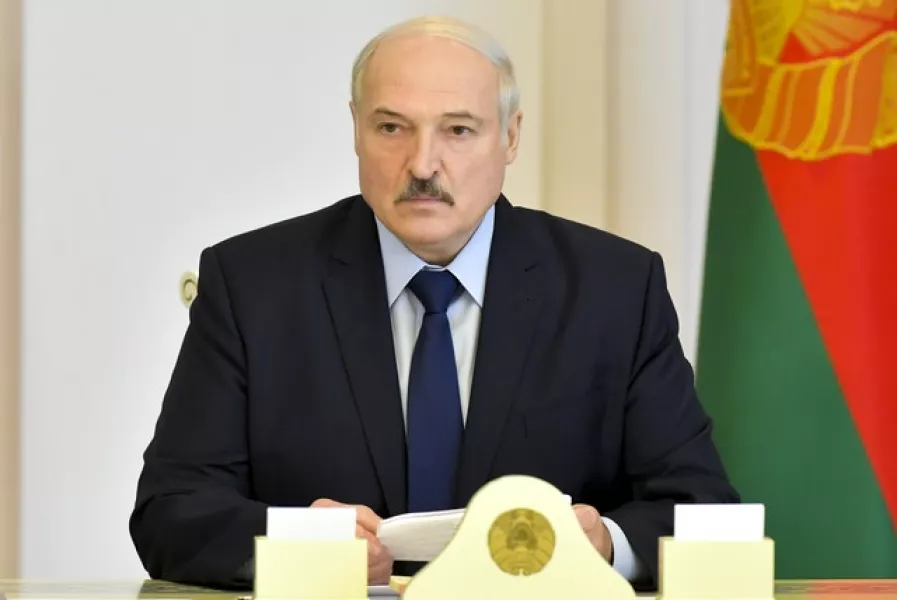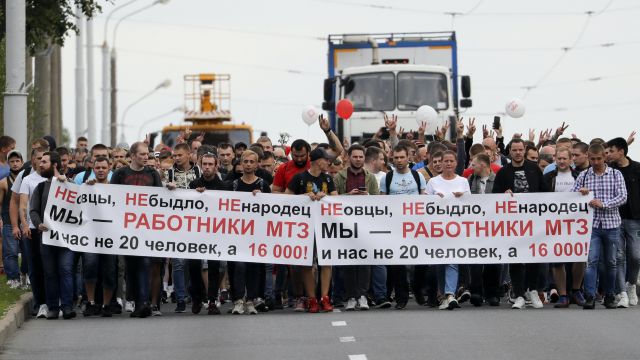Factory workers marched across the city shouting “Go away!” in a call for authoritarian President Alexander Lukashenko to resign after 26 years of iron-fisted rule that was extended in an election on Sunday that protesters denounced as rigged.
Friday’s crowds in Minsk grew to more than 20,000, filling central Independence Square.

About a dozen soldiers guarding the nearby government headquarters lowered their riot shields in what the demonstrators saw as a sign of solidarity, and women rushed to embrace and kiss them.
Earlier, police did not interfere as the protesters marched across the city, reflecting Mr Lukashenko’s apparent attempt to assuage the opposition by stepping back from the violent police crackdowns seen across the country earlier this week.
The release by the Interior Ministry of about 2,000 of the nearly 7,000 people detained was seen as another move to defuse popular outrage, and it said more would be freed.
Many who were released spoke of beatings and other abuse by police, and some showed bruises on their bodies. Some wept as they embraced waiting relatives.

Demonstrators have swarmed the streets since Sunday’s election in which officials reported that Mr Lukashenko won 80% of the vote to extend his hold on power.
Mr Lukashenko’s main challenger, Sviatlana Tsikhanouskaya, who fled on Tuesday to neighbouring Lithuania, posted a video in which she disputed the results of the vote and demanded that the government start a dialogue with demonstrators.
European Union foreign ministers are due to meet to discuss possible sanctions against Belarus.
Hundreds of people have been injured since Sunday as police dispersed largely peaceful demonstrations with stun grenades, tear gas, rubber bullets and severe beatings. At least one person has been killed.
Thousands of factory workers who previously formed the core of Mr Lukashenko’s base have joined the protests, denouncing the crackdown and demanding a new election, raising the prospect of a nationwide strike.

Workers rallied at many major factories in an unprecedented challenge to the president, who has been in power since 1994 and earned the nickname of “Europe’s last dictator” for his suppression of dissent.
He warned on Friday that the strikes would deepen the damage inflicted by the coronavirus pandemic and could lead to Belarus losing its niche in global markets.
“Everyone is fighting for markets, and if we stop we will never be able to resume production,” he said. “You must explain it to the people.”
He did not directly address the election and the protests, but Natalya Kochanova, speaker of the upper house of parliament, said late on Thursday that more than 1,000 detainees had been released that day following Mr Lukashenko’s order to law enforcement agencies to look more closely into the detentions.
“We don’t need a war, we don’t need a fight,” she said in televised remarks.
Valiantsin Stefanovich of the Viasna rights centre confirmed that about 1,000 people were released from jails in Minsk and Zhodino, adding: “The authorities are obviously trying to de-escalate the situation and ease the tensions, fearing that the furious industrial workers will take to the streets all across Belarus.”
The Interior Ministry later said 2,000 detainees had been freed and more would follow.







